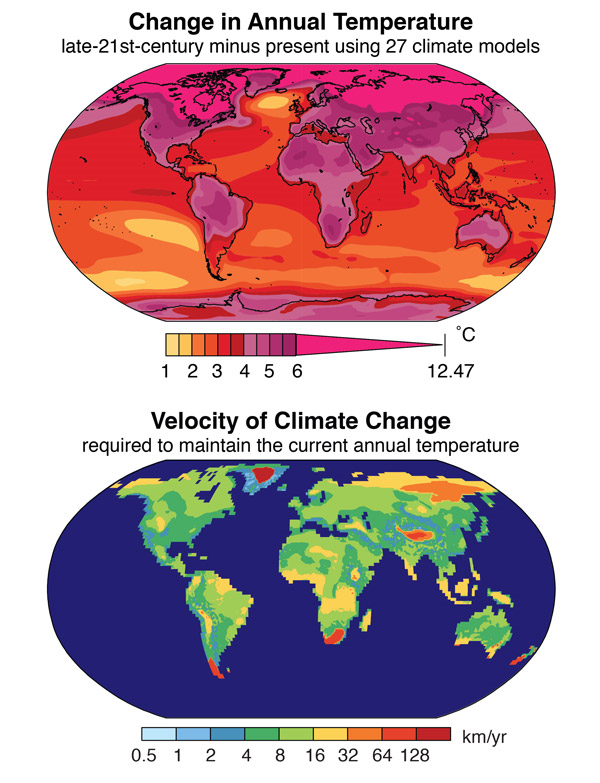Global warming more rapid than any time in the last 65 million years, ‘presents terrestrial ecosystems with an environment that is unprecedented in recent evolutionary history’
By Jeremy Hance
1 August 2013 (mongabay.com) – According to a new review of 27 climate models, scientists say the global climate is likely to experience a warmth as great as any in the last 65 million years, only much, much faster. According to the study published today in Science, the Earth’s land temperature will rise by 4 degrees Celsius (7.2 degrees Fahrenheit) from pre-industrial levels by 2100 if we continue on our current emissions trajectory. “What is perhaps most noteworthy is the rate of change,” says co-author Noah Suresh Diffenbaugh with Stanford University. “For instance, the rapid global warming event that occurred some 55 million years ago was as large as these warming projections, but that event occurred over many thousands of years, not a mere century.” If it occurs, the temperature rise would be 10 times faster than anything seen since the mass extinction of the dinosaurs, creating unknown impacts on the Earth’s species and ecosystems. “It’s not easy to intuit the exact impact from annual temperatures warming by 6 C,” Diffenbaugh said. “But this would present a novel climate for most land areas. Given the impacts those kinds of seasons currently have on terrestrial forests, agriculture and human health, we’ll likely see substantial stress from severely hot conditions.” More warming, the scientists warn, will certainly intensify severe weather and make today’s hottest summers the norm. The scientists write that this warming over such a short span could make it impossible for many species to adapt. “Species and ecosystems will encounter not only a range of climate conditions that is potentially different from any in the past but also the broader conditions of the Anthropocene, in which human actions either dominate or strongly influence a wide range of Earth system processes,” the researchers write. Even if a species is capable of outrunning global climate change, it may not be able to in the face of habitat destruction, pollution, invasive species, and overexploitation. The scientists note that the combination of rapid global warming and human ecological impacts “will present terrestrial ecosystems with an environment that is unprecedented in recent evolutionary history.” Greenhouse gas emissions from burning fossil fuels, deforestation, and industrial agriculture have already warmed the Earth around 0.8 degrees Celsius (1.44 degrees Fahrenheit) over the last hundred years. The warming to date has led to rising sea levels, worsening heatwaves, melting Arctic sea ice, and vanishing glaciers among other impacts. […] “The future of the planet lies in our hands,” notes co-author Chris Field also with Stanford. [more]
Climate could warm more rapidly than any time in the last 65 million years

I pity the fossil fuel investors. Who will buy gas to tour national patks when they are gone?
Ladies and Gentlemen,
Scientists warn of a rapid collapse of the Earth's ecosystem.
The ecological balance is under threat: climate change, population growth and environmental degradation could lead even in this century an irreversible collapse of the global ecosystem.
–> http://newscenter.berkeley.edu/2012/06/06/scientists-uncover-evidence-of-impending-tipping-point-for-earth/
The cardinal reason is the sudden development of human population that threatens to devour all our resources.
Since 21 August there is therefore a petition at change.org for the introduction of global birth-controls, also in HINDI!
If you want to support this or publish it on your website, here is the link:
http://www.change.org/de/Petitionen/weltweite-geburtenregelungen-verbindlich-einf%C3%BChren-introduce-obligatory-worldwide-birth-controls
Please continue to spread the link or the petition as possible to all interested people, organisations etc.
Thank you and best regards
Achim Wolf, Germany